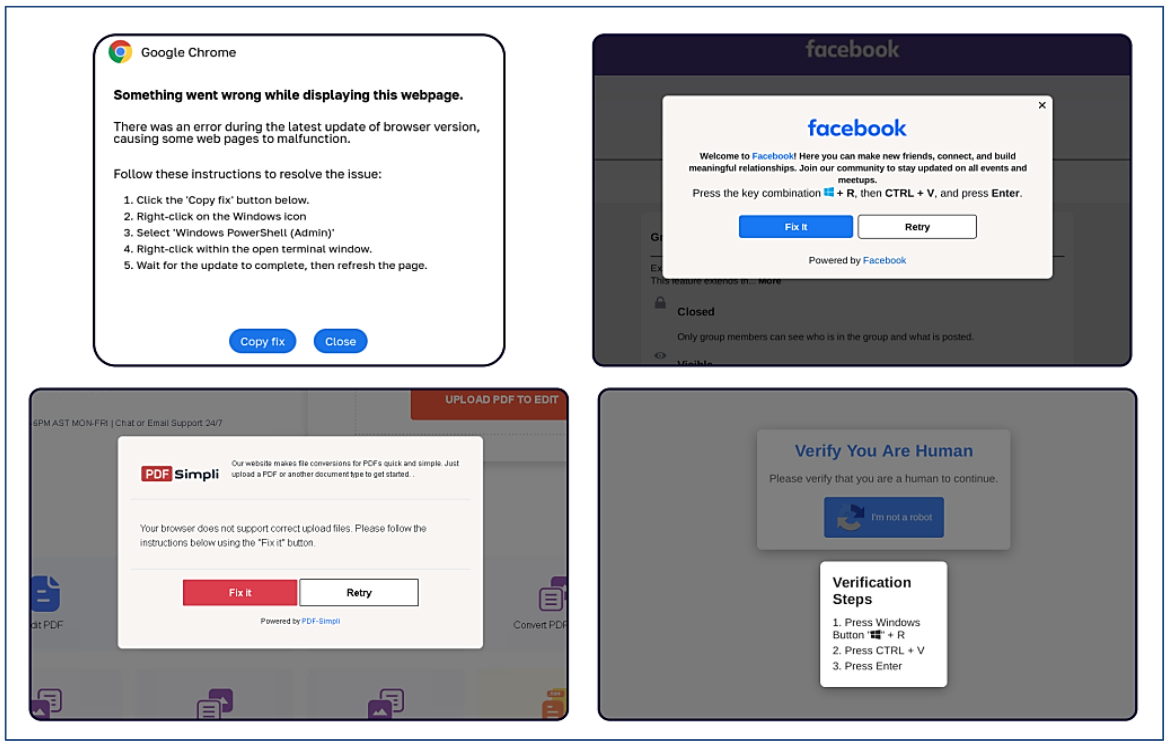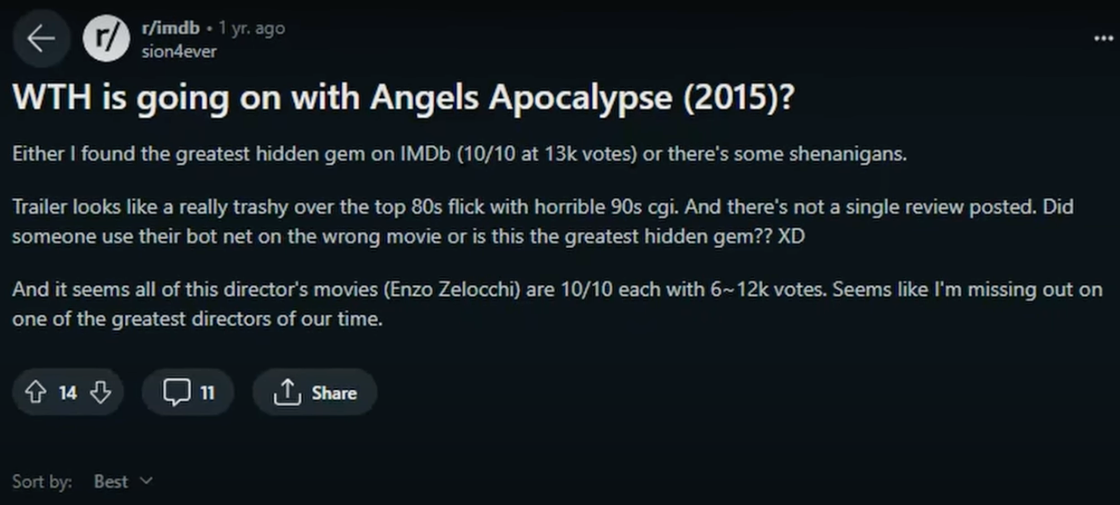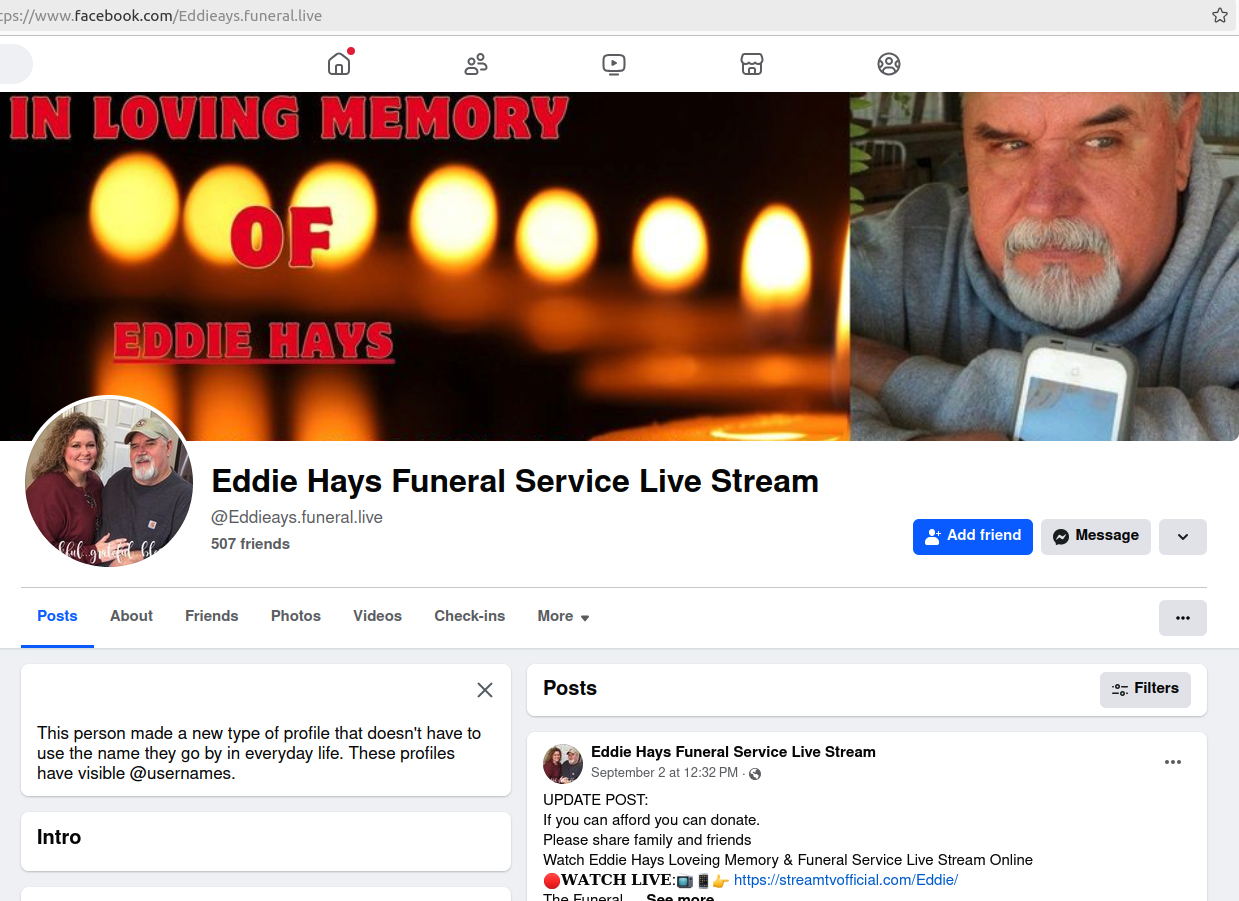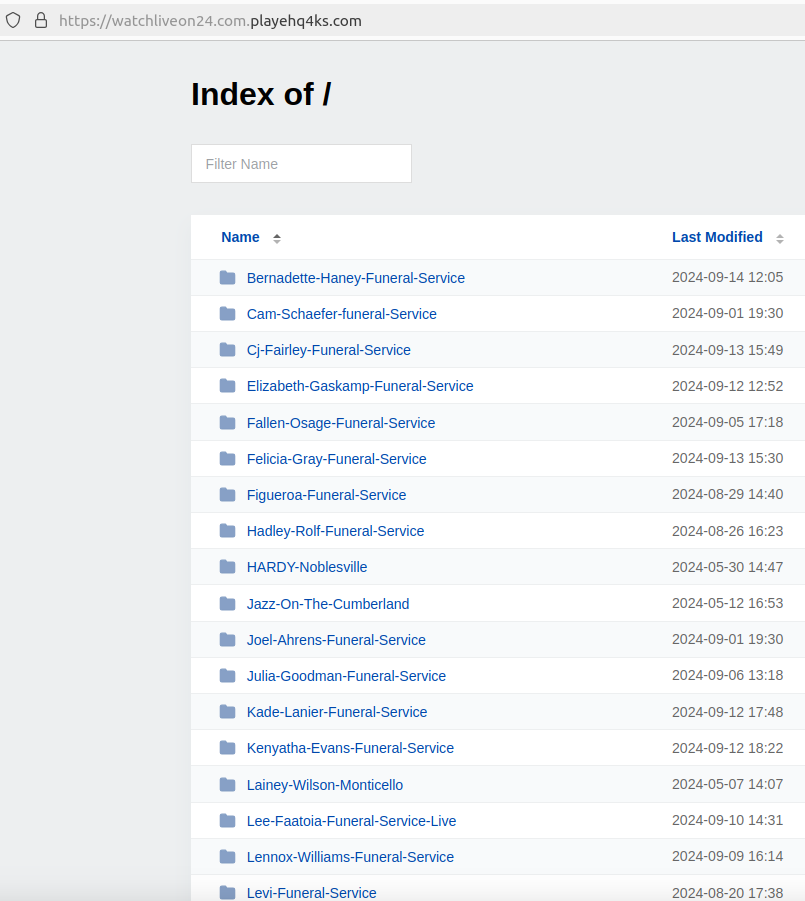In May 2025, the U.S. government sanctioned a Chinese national for operating a cloud provider linked to the majority of virtual currency investment scam websites reported to the FBI. But a new report finds the accused continues to operate a slew of established accounts at American tech companies — including Facebook, Github, PayPal and Twitter/X.
On May 29, the U.S. Department of the Treasury announced economic sanctions against Funnull Technology Inc., a Philippines-based company alleged to provide infrastructure for hundreds of thousands of websites involved in virtual currency investment scams known as “pig butchering.” In January 2025, KrebsOnSecurity detailed how Funnull was designed as a content delivery network that catered to foreign cybercriminals seeking to route their traffic through U.S.-based cloud providers.

The Treasury also sanctioned Funnull’s alleged operator, a 40-year-old Chinese national named Liu “Steve” Lizhi. The government says Funnull directly facilitated financial schemes resulting in more than $200 million in financial losses by Americans, and that the company’s operations were linked to the majority of pig butchering scams reported to the FBI.
It is generally illegal for U.S. companies or individuals to transact with people sanctioned by the Treasury. However, as Mr. Lizhi’s case makes clear, just because someone is sanctioned doesn’t necessarily mean big tech companies are going to suspend their online accounts.
The government says Lizhi was born November 13, 1984, and used the nicknames “XXL4” and “Nice Lizhi.” Nevertheless, Steve Liu’s 17-year-old account on LinkedIn (in the name “Liulizhi”) had hundreds of followers (Lizhi’s LinkedIn profile helpfully confirms his birthday) until quite recently: The account was deleted this morning, just hours after KrebsOnSecurity sought comment from LinkedIn.

Mr. Lizhi’s LinkedIn account was suspended sometime in the last 24 hours, after KrebsOnSecurity sought comment from LinkedIn.
In an emailed response, a LinkedIn spokesperson said the company’s “Prohibited countries policy” states that LinkedIn “does not sell, license, support or otherwise make available its Premium accounts or other paid products and services to individuals and companies sanctioned by the U.S. government.” LinkedIn declined to say whether the profile in question was a premium or free account.
Mr. Lizhi also maintains a working PayPal account under the name Liu Lizhi and username “@nicelizhi,” another nickname listed in the Treasury sanctions. A 15-year-old Twitter/X account named “Lizhi” that links to Mr. Lizhi’s personal domain remains active, although it has few followers and hasn’t posted in years.
These accounts and many others were flagged by the security firm Silent Push, which has been tracking Funnull’s operations for the past year and calling out U.S. cloud providers like Amazon and Microsoft for failing to more quickly sever ties with the company.

Liu Lizhi’s PayPal account.
In a report released today, Silent Push found Lizhi still operates numerous Facebook accounts and groups, including a private Facebook account under the name Liu Lizhi. Another Facebook account clearly connected to Lizhi is a tourism page for Ganzhou, China called “EnjoyGanzhou” that was named in the Treasury Department sanctions.
“This guy is the technical administrator for the infrastructure that is hosting a majority of scams targeting people in the United States, and hundreds of millions have been lost based on the websites he’s been hosting,” said Zach Edwards, senior threat researcher at Silent Push. “It’s crazy that the vast majority of big tech companies haven’t done anything to cut ties with this guy.”
The FBI says it received nearly 150,000 complaints last year involving digital assets and $9.3 billion in losses — a 66 percent increase from the previous year. Investment scams were the top crypto-related crimes reported, with $5.8 billion in losses.
In a statement, a Meta spokesperson said the company continuously takes steps to meet its legal obligations, but that sanctions laws are complex and varied. They explained that sanctions are often targeted in nature and don’t always prohibit people from having a presence on its platform. Nevertheless, Meta confirmed it had removed the account, unpublished Pages, and removed Groups and events associated with the user for violating its policies.
Attempts to reach Mr. Lizhi via his primary email addresses at Hotmail and Gmail bounced as undeliverable. Likewise, his 14-year-old YouTube channel appears to have been taken down recently.
However, anyone interested in viewing or using Mr. Lizhi’s 146 computer code repositories will have no problem finding GitHub accounts for him, including one registered under the NiceLizhi and XXL4 nicknames mentioned in the Treasury sanctions.

One of multiple GitHub profiles used by Liu “Steve” Lizhi, who uses the nickname XXL4 (a moniker listed in the Treasury sanctions for Mr. Lizhi).
Mr. Lizhi also operates a GitHub page for an open source e-commerce platform called NexaMerchant, which advertises itself as a payment gateway working with numerous American financial institutions. Interestingly, this profile’s “followers” page shows several other accounts that appear to be Mr. Lizhi’s. All of the account’s followers are tagged as “suspended,” even though that suspended message does not display when one visits those individual profiles.
In response to questions, GitHub said it has a process in place to identify when users and customers are Specially Designated Nationals or other denied or blocked parties, but that it locks those accounts instead of removing them. According to its policy, GitHub takes care that users and customers aren’t impacted beyond what is required by law.

All of the follower accounts for the XXL4 GitHub account appear to be Mr. Lizhi’s, and have been suspended by GitHub, but their code is still accessible.
“This includes keeping public repositories, including those for open source projects, available and accessible to support personal communications involving developers in sanctioned regions,” the policy states. “This also means GitHub will advocate for developers in sanctioned regions to enjoy greater access to the platform and full access to the global open source community.”
Edwards said it’s great that GitHub has a process for handling sanctioned accounts, but that the process doesn’t seem to communicate risk in a transparent way, noting that the only indicator on the locked accounts is the message, “This repository has been archived by the owner. It is not read-only.”
“It’s an odd message that doesn’t communicate, ‘This is a sanctioned entity, don’t fork this code or use it in a production environment’,” Edwards said.
Mark Rasch is a former federal cybercrime prosecutor who now serves as counsel for the New York City based security consulting firm Unit 221B. Rasch said when Treasury’s Office of Foreign Assets Control (OFAC) sanctions a person or entity, it then becomes illegal for businesses or organizations to transact with the sanctioned party.
Rasch said financial institutions have very mature systems for severing accounts tied to people who become subject to OFAC sanctions, but that tech companies may be far less proactive — particularly with free accounts.
“Banks have established ways of checking [U.S. government sanctions lists] for sanctioned entities, but tech companies don’t necessarily do a good job with that, especially for services that you can just click and sign up for,” Rasch said. “It’s potentially a risk and liability for the tech companies involved, but only to the extent OFAC is willing to enforce it.”

Liu Lizhi operates numerous Facebook accounts and groups, including this one for an entity specified in the OFAC sanctions: The “Enjoy Ganzhou” tourism page for Ganzhou, China. Image: Silent Push.
In July 2024, Funnull purchased the domain polyfill[.]io, the longtime home of a legitimate open source project that allowed websites to ensure that devices using legacy browsers could still render content in newer formats. After the Polyfill domain changed hands, at least 384,000 websites were caught in a supply-chain attack that redirected visitors to malicious sites. According to the Treasury, Funnull used the code to redirect people to scam websites and online gambling sites, some of which were linked to Chinese criminal money laundering operations.
The U.S. government says Funnull provides domain names for websites on its purchased IP addresses, using domain generation algorithms (DGAs) — programs that generate large numbers of similar but unique names for websites — and that it sells web design templates to cybercriminals.
“These services not only make it easier for cybercriminals to impersonate trusted brands when creating scam websites, but also allow them to quickly change to different domain names and IP addresses when legitimate providers attempt to take the websites down,” reads a Treasury statement.
Meanwhile, Funnull appears to be morphing nearly all aspects of its business in the wake of the sanctions, Edwards said.
“Whereas before they might have used 60 DGA domains to hide and bounce their traffic, we’re seeing far more now,” he said. “They’re trying to make their infrastructure harder to track and more complicated, so for now they’re not going away but more just changing what they’re doing. And a lot more organizations should be holding their feet to the fire.”
Update, 2:48 PM ET: Added response from Meta, which confirmed it has closed the accounts and groups connected to Mr. Lizhi.
Update, July 7, 6:56 p.m. ET: In a written statement, PayPal said it continually works to combat and prevent the illicit use of its services.
“We devote significant resources globally to financial crime compliance, and we proactively refer cases to and assist law enforcement officials around the world in their efforts to identify, investigate and stop illegal activity,” the statement reads.
“Congress shall make no law respecting an establishment of religion, or prohibiting the free exercise thereof; or abridging the freedom of speech, or of the press; or the right of the people peaceably to assemble, and to petition the Government for a redress of grievances.” -U.S. Constitution, First Amendment.

Image: Shutterstock, zimmytws.
In an address to Congress this month, President Trump claimed he had “brought free speech back to America.” But barely two months into his second term, the president has waged an unprecedented attack on the First Amendment rights of journalists, students, universities, government workers, lawyers and judges.
This story explores a slew of recent actions by the Trump administration that threaten to undermine all five pillars of the First Amendment to the U.S. Constitution, which guarantees freedoms concerning speech, religion, the media, the right to assembly, and the right to petition the government and seek redress for wrongs.
The right to petition allows citizens to communicate with the government, whether to complain, request action, or share viewpoints — without fear of reprisal. But that right is being assaulted by this administration on multiple levels. For starters, many GOP lawmakers are now heeding their leadership’s advice to stay away from local town hall meetings and avoid the wrath of constituents affected by the administration’s many federal budget and workforce cuts.
Another example: President Trump recently fired most of the people involved in processing Freedom of Information Act (FOIA) requests for government agencies. FOIA is an indispensable tool used by journalists and the public to request government records, and to hold leaders accountable.
The biggest story by far this week was the bombshell from The Atlantic editor Jeffrey Goldberg, who recounted how he was inadvertently added to a Signal group chat with National Security Advisor Michael Waltz and 16 other Trump administration officials discussing plans for an upcoming attack on Yemen.
One overlooked aspect of Goldberg’s incredible account is that by planning and coordinating the attack on Signal — which features messages that can auto-delete after a short time — administration officials were evidently seeking a way to avoid creating a lasting (and potentially FOIA-able) record of their deliberations.
“Intentional or not, use of Signal in this context was an act of erasure—because without Jeffrey Goldberg being accidentally added to the list, the general public would never have any record of these communications or any way to know they even occurred,” Tony Bradley wrote this week at Forbes.
Petitioning the government, particularly when it ignores your requests, often requires challenging federal agencies in court. But that becomes far more difficult if the most competent law firms start to shy away from cases that may involve crossing the president and his administration.
On March 22, the president issued a memorandum that directs heads of the Justice and Homeland Security Departments to “seek sanctions against attorneys and law firms who engage in frivolous, unreasonable and vexatious litigation against the United States,” or in matters that come before federal agencies.
The POTUS recently issued several executive orders railing against specific law firms with attorneys who worked legal cases against him. On Friday, the president announced that the law firm of Skadden, Arps, Slate, Meager & Flom had agreed to provide $100 million in pro bono work on issues that he supports.
Trump issued another order naming the firm Paul, Weiss, Rifkind, Wharton & Garrison, which ultimately agreed to pledge $40 million in pro bono legal services to the president’s causes.
Other Trump executive orders targeted law firms Jenner & Block and WilmerHale, both of which have attorneys that worked with special counsel Robert Mueller on the investigation into Russian interference in the 2016 election. But this week, two federal judges in separate rulings froze parts of those orders.
“There is no doubt this retaliatory action chills speech and legal advocacy, and that is qualified as a constitutional harm,” wrote Judge Richard Leon, who ruled against the executive order targeting WilmerHale.
President Trump recently took the extraordinary step of calling for the impeachment of federal judges who rule against the administration. Trump called U.S. District Judge James Boasberg a “Radical Left Lunatic” and urged he be removed from office for blocking deportation of Venezuelan alleged gang members under a rarely invoked wartime legal authority.
In a rare public rebuke to a sitting president, U.S. Supreme Court Justice John Roberts issued a statement on March 18 pointing out that “For more than two centuries, it has been established that impeachment is not an appropriate response to disagreement concerning a judicial decision.”
The U.S. Constitution provides that judges can be removed from office only through impeachment by the House of Representatives and conviction by the Senate. The Constitution also states that judges’ salaries cannot be reduced while they are in office.
Undeterred, House Speaker Mike Johnson this week suggested the administration could still use the power of its purse to keep courts in line, and even floated the idea of wholesale eliminating federal courts.
“We do have authority over the federal courts as you know,” Johnson said. “We can eliminate an entire district court. We have power of funding over the courts, and all these other things. But desperate times call for desperate measures, and Congress is going to act, so stay tuned for that.”
President Trump has taken a number of actions to discourage lawful demonstrations at universities and colleges across the country, threatening to cut federal funding for any college that supports protests he deems “illegal.”
A Trump executive order in January outlined a broad federal crackdown on what he called “the explosion of antisemitism” on U.S. college campuses. This administration has asserted that foreign students who are lawfully in the United States on visas do not enjoy the same free speech or due process rights as citizens.
Reuters reports that the acting civil rights director at the Department of Education on March 10 sent letters to 60 educational institutions warning they could lose federal funding if they don’t do more to combat anti-semitism. On March 20, Trump issued an order calling for the closure of the Education Department.
Meanwhile, U.S. Immigration and Customs Enforcement (ICE) agents have been detaining and trying to deport pro-Palestinian students who are legally in the United States. The administration is targeting students and academics who spoke out against Israel’s attacks on Gaza, or who were active in campus protests against U.S. support for the attacks. Secretary of State Marco Rubio told reporters Thursday that at least 300 foreign students have seen their visas revoked under President Trump, a far higher number than was previously known.
In his first term, Trump threatened to use the national guard or the U.S. military to deal with protesters, and in campaigning for re-election he promised to revisit the idea.
“I think the bigger problem is the enemy from within,” Trump told Fox News in October 2024. “We have some very bad people. We have some sick people, radical left lunatics. And I think they’re the big — and it should be very easily handled by, if necessary, by National Guard, or if really necessary, by the military, because they can’t let that happen.”
This term, Trump acted swiftly to remove the top judicial advocates in the armed forces who would almost certainly push back on any request by the president to use U.S. soldiers in an effort to quell public protests, or to arrest and detain immigrants. In late February, the president and Defense Secretary Pete Hegseth fired the top legal officers for the military services — those responsible for ensuring the Uniform Code of Military Justice is followed by commanders.
Military.com warns that the purge “sets an alarming precedent for a crucial job in the military, as President Donald Trump has mused about using the military in unorthodox and potentially illegal ways.” Hegseth told reporters the removals were necessary because he didn’t want them to pose any “roadblocks to orders that are given by a commander in chief.”
President Trump has sued a number of U.S. news outlets, including 60 Minutes, CNN, The Washington Post, The New York Times and other smaller media organizations for unflattering coverage.
In a $10 billion lawsuit against 60 Minutes and its parent Paramount, Trump claims they selectively edited an interview with former Vice President Kamala Harris prior to the 2024 election. The TV news show last month published transcripts of the interview at the heart of the dispute, but Paramount is reportedly considering a settlement to avoid potentially damaging its chances of winning the administration’s approval for a pending multibillion-dollar merger.
The president sued The Des Moines Register and its parent company, Gannett, for publishing a poll showing Trump trailing Harris in the 2024 presidential election in Iowa (a state that went for Trump). The POTUS also is suing the Pulitzer Prize board over 2018 awards given to The New York Times and The Washington Post for their coverage of purported Russian interference in the 2016 election.
Whether or not any of the president’s lawsuits against news organizations have merit or succeed is almost beside the point. The strategy behind suing the media is to make reporters and newsrooms think twice about criticizing or challenging the president and his administration. The president also knows some media outlets will find it more expedient to settle.
Trump also sued ABC News and George Stephanopoulos for stating that the president had been found liable for “rape” in a civil case [Trump was found liable of sexually abusing and defaming E. Jean Carroll]. ABC parent Disney settled that claim by agreeing to donate $15 million to the Trump Presidential Library.
Following the attack on the U.S. Capitol on Jan. 6, 2021, Facebook blocked President Trump’s account. Trump sued Meta, and after the president’s victory in 2024 Meta settled and agreed to pay Trump $25 million: $22 million would go to his presidential library, and the rest to legal fees. Meta CEO Mark Zuckerberg also announced Facebook and Instagram would get rid of fact-checkers and rely instead on reader-submitted “community notes” to debunk disinformation on the social media platform.
Brendan Carr, the president’s pick to run the Federal Communications Commission (FCC), has pledged to “dismantle the censorship cartel and restore free speech rights for everyday Americans.” But on January 22, 2025, the FCC reopened complaints against ABC, CBS and NBC over their coverage of the 2024 election. The previous FCC chair had dismissed the complaints as attacks on the First Amendment and an attempt to weaponize the agency for political purposes.
According to Reuters, the complaints call for an investigation into how ABC News moderated the pre-election TV debate between Trump and Biden, and appearances of then-Vice President Harris on 60 Minutes and on NBC’s “Saturday Night Live.”
Since then, the FCC has opened investigations into NPR and PBS, alleging that they are breaking sponsorship rules. The Center for Democracy & Technology (CDT), a think tank based in Washington, D.C., noted that the FCC is also investigating KCBS in San Francisco for reporting on the location of federal immigration authorities.
“Even if these investigations are ultimately closed without action, the mere fact of opening them – and the implicit threat to the news stations’ license to operate – can have the effect of deterring the press from news coverage that the Administration dislikes,” the CDT’s Kate Ruane observed.
Trump has repeatedly threatened to “open up” libel laws, with the goal of making it easier to sue media organizations for unfavorable coverage. But this week, the U.S. Supreme Court declined to hear a challenge brought by Trump donor and Las Vegas casino magnate Steve Wynn to overturn the landmark 1964 decision in New York Times v. Sullivan, which insulates the press from libel suits over good-faith criticism of public figures.
The president also has insisted on picking which reporters and news outlets should be allowed to cover White House events and participate in the press pool that trails the president. He barred the Associated Press from the White House and Air Force One over their refusal to call the Gulf of Mexico by another name.
And the Defense Department has ordered a number of top media outlets to vacate their spots at the Pentagon, including CNN, The Hill, The Washington Post, The New York Times, NBC News, Politico and National Public Radio.
“Incoming media outlets include the New York Post, Breitbart, the Washington Examiner, the Free Press, the Daily Caller, Newsmax, the Huffington Post and One America News Network, most of whom are seen as conservative or favoring Republican President Donald Trump,” Reuters reported.
Shortly after Trump took office again in January 2025, the administration began circulating lists of hundreds of words that government staff and agencies shall not use in their reports and communications.
The Brookings Institution notes that in moving to comply with this anti-speech directive, federal agencies have purged countless taxpayer-funded data sets from a swathe of government websites, including data on crime, sexual orientation, gender, education, climate, and global development.
The New York Times reports that in the past two months, hundreds of terabytes of digital resources analyzing data have been taken off government websites.
“While in many cases the underlying data still exists, the tools that make it possible for the public and researchers to use that data have been removed,” The Times wrote.
On Jan. 27, Trump issued a memo (PDF) that paused all federally funded programs pending a review of those programs for alignment with the administration’s priorities. Among those was ensuring that no funding goes toward advancing “Marxist equity, transgenderism, and green new deal social engineering policies.”
According to the CDT, this order is a blatant attempt to force government grantees to cease engaging in speech that the current administration dislikes, including speech about the benefits of diversity, climate change, and LGBTQ issues.
“The First Amendment does not permit the government to discriminate against grantees because it does not like some of the viewpoints they espouse,” the CDT’s Ruane wrote. “Indeed, those groups that are challenging the constitutionality of the order argued as much in their complaint, and have won an injunction blocking its implementation.”
On January 20, the same day Trump issued an executive order on free speech, the president also issued an executive order titled “Reevaluating and Realigning United States Foreign Aid,” which froze funding for programs run by the U.S. Agency for International Development (USAID). Among those were programs designed to empower civil society and human rights groups, journalists and others responding to digital repression and Internet shutdowns.
According to the Electronic Frontier Foundation (EFF), this includes many freedom technologies that use cryptography, fight censorship, protect freedom of speech, privacy and anonymity for millions of people around the world.
“While the State Department has issued some limited waivers, so far those waivers do not seem to cover the open source internet freedom technologies,” the EFF wrote about the USAID disruptions. “As a result, many of these projects have to stop or severely curtail their work, lay off talented workers, and stop or slow further development.”
On March 14, the president signed another executive order that effectively gutted the U.S. Agency for Global Media (USAGM), which oversees or funds media outlets including Radio Free Europe/Radio Liberty and Voice of America (VOA). The USAGM also oversees Radio Free Asia, which supporters say has been one of the most reliable tools used by the government to combat Chinese propaganda.
But this week, U.S. District Court Judge Royce Lamberth, a Reagan appointee, temporarily blocked USAGM’s closure by the administration.
“RFE/RL has, for decades, operated as one of the organizations that Congress has statutorily designated to carry out this policy,” Lamberth wrote in a 10-page opinion. “The leadership of USAGM cannot, with one sentence of reasoning offering virtually no explanation, force RFE/RL to shut down — even if the President has told them to do so.”
The Trump administration rescinded a decades-old policy that instructed officers not to take immigration enforcement actions in or near “sensitive” or “protected” places, such as churches, schools, and hospitals.
That directive was immediately challenged in a case brought by a group of Quakers, Baptists and Sikhs, who argued the policy reversal was keeping people from attending services for fear of being arrested on civil immigration violations. On Feb. 24, a federal judge agreed and blocked ICE agents from entering churches or targeting migrants nearby.
The president’s executive order allegedly addressing antisemitism came with a fact sheet that described college campuses as “infested” with “terrorists” and “jihadists.” Multiple faith groups expressed alarm over the order, saying it attempts to weaponize antisemitism and promote “dehumanizing anti-immigrant policies.”
The president also announced the creation of a “Task Force to Eradicate Anti-Christian Bias,” to be led by Attorney General Pam Bondi. Never mind that Christianity is easily the largest faith in America and that Christians are well-represented in Congress.
The Rev. Paul Brandeis Raushenbush, a Baptist minister and head of the progressive Interfaith Alliance, issued a statement accusing Trump of hypocrisy in claiming to champion religion by creating the task force.
“From allowing immigration raids in churches, to targeting faith-based charities, to suppressing religious diversity, the Trump Administration’s aggressive government overreach is infringing on religious freedom in a way we haven’t seen for generations,” Raushenbush said.
A statement from Americans United for Separation of Church and State said the task force could lead to religious persecution of those with other faiths.
“Rather than protecting religious beliefs, this task force will misuse religious freedom to justify bigotry, discrimination, and the subversion of our civil rights laws,” said Rachel Laser, the group’s president and CEO.
Where is President Trump going with all these blatant attacks on the First Amendment? The president has made no secret of his affection for autocratic leaders and “strongmen” around the world, and he is particularly enamored with Hungary’s far-right Prime Minister Viktor Orbán, who has visited Trump’s Mar-a-Lago resort twice in the past year.
A March 15 essay in The Atlantic by Hungarian investigative journalist András Pethő recounts how Orbán rose to power by consolidating control over the courts, and by building his own media universe while simultaneously placing a stranglehold on the independent press.
“As I watch from afar what’s happening to the free press in the United States during the first weeks of Trump’s second presidency — the verbal bullying, the legal harassment, the buckling by media owners in the face of threats — it all looks very familiar,” Pethő wrote. “The MAGA authorities have learned Orbán’s lessons well.”
A clever malware deployment scheme first spotted in targeted attacks last year has now gone mainstream. In this scam, dubbed “ClickFix,” the visitor to a hacked or malicious website is asked to distinguish themselves from bots by pressing a combination of keyboard keys that causes Microsoft Windows to download password-stealing malware.
ClickFix attacks mimic the “Verify You are a Human” tests that many websites use to separate real visitors from content-scraping bots. This particular scam usually starts with a website popup that looks something like this:

This malware attack pretends to be a CAPTCHA intended to separate humans from bots.
Clicking the “I’m not a robot” button generates a pop-up message asking the user to take three sequential steps to prove their humanity.

Executing this series of keypresses prompts Windows to download password-stealing malware.
Step 1 involves simultaneously pressing the keyboard key with the Windows icon and the letter “R,” which opens a Windows “Run” prompt that will execute any specified program that is already installed on the system.
Step 2 asks the user to press the “CTRL” key and the letter “V” at the same time, which pastes malicious code from the site’s virtual clipboard.
Step 3 — pressing the “Enter” key — causes Windows to download and launch malicious code through “mshta.exe,” a Windows program designed to run Microsoft HTML application files.
“This campaign delivers multiple families of commodity malware, including XWorm, Lumma stealer, VenomRAT, AsyncRAT, Danabot, and NetSupport RAT,” Microsoft wrote in a blog post on Thursday. “Depending on the specific payload, the specific code launched through mshta.exe varies. Some samples have downloaded PowerShell, JavaScript, and portable executable (PE) content.”
According to Microsoft, hospitality workers are being tricked into downloading credential-stealing malware by cybercriminals impersonating Booking.com. The company said attackers have been sending malicious emails impersonating Booking.com, often referencing negative guest reviews, requests from prospective guests, or online promotion opportunities — all in a bid to convince people to step through one of these ClickFix attacks.
In November 2024, KrebsOnSecurity reported that hundreds of hotels that use booking.com had been subject to targeted phishing attacks. Some of those lures worked, and allowed thieves to gain control over booking.com accounts. From there, they sent out phishing messages asking for financial information from people who’d just booked travel through the company’s app.
Earlier this month, the security firm Arctic Wolf warned about ClickFix attacks targeting people working in the healthcare sector. The company said those attacks leveraged malicious code stitched into the widely used physical therapy video site HEP2go that redirected visitors to a ClickFix prompt.
An alert (PDF) released in October 2024 by the U.S. Department of Health and Human Services warned that the ClickFix attack can take many forms, including fake Google Chrome error pages and popups that spoof Facebook.

ClickFix tactic used by malicious websites impersonating Google Chrome, Facebook, PDFSimpli, and reCAPTCHA. Source: Sekoia.
The ClickFix attack — and its reliance on mshta.exe — is reminiscent of phishing techniques employed for years that hid exploits inside Microsoft Office macros. Malicious macros became such a common malware threat that Microsoft was forced to start blocking macros by default in Office documents that try to download content from the web.
Alas, the email security vendor Proofpoint has documented plenty of ClickFix attacks via phishing emails that include HTML attachments spoofing Microsoft Office files. When opened, the attachment displays an image of Microsoft Word document with a pop-up error message directing users to click the “Solution” or “How to Fix” button.

HTML files containing ClickFix instructions. Examples for attachments named “Report_” (on the left) and “scan_doc_” (on the right). Image: Proofpoint.
Organizations that wish to do so can take advantage of Microsoft Group Policy restrictions to prevent Windows from executing the “run” command when users hit the Windows key and the “R” key simultaneously.
A California man accused of failing to pay taxes on tens of millions of dollars allegedly earned from cybercrime also paid local police officers hundreds of thousands of dollars to help him extort, intimidate and silence rivals and former business partners, the government alleges. KrebsOnSecurity has learned that many of the man’s alleged targets were members of UGNazi, a hacker group behind multiple high-profile breaches and cyberattacks back in 2012.

A photo released by the government allegedly showing Iza posing with several LASD officers on his payroll.
A federal complaint (PDF) filed last week said the Federal Bureau of Investigation (FBI) has been investigating Los Angeles resident Adam Iza. Also known as “Assad Faiq” and “The Godfather,” Iza is the founder of a cryptocurrency investment platform called Zort that advertised the ability to make smart trades based on artificial intelligence technology.
But the feds say investors in Zort soon lost their shorts, after Iza and his girlfriend began spending those investments on Lamborghinis, expensive jewelry, vacations, a $28 million home in Bel Air, even cosmetic surgery to extend the length of his legs.
The complaint states the FBI started looking at Iza after receiving multiple reports that he had on his payroll several active deputies with the Los Angeles Sheriff’s Department (LASD). Iza’s attorney did not immediately respond to requests for comment.
The complaint cites a letter from an attorney for a victim referenced only as “E.Z.,” who was seeking help related to an extortion and robbery allegedly committed by Iza. The government says that in March 2022, three men showed up at E.Z.’s home, and tried to steal his laptop in an effort to gain access to E.Z. cryptocurrency holdings online. A police report referenced in the complaint says three intruders were scared off when E.Z. fired several handgun rounds in the direction of his assailants.
The FBI later obtained a copy of a search warrant executed by LASD deputies in January 2022 for GPS location information on a phone belonging to E.Z., which shows an LASD deputy unlawfully added E.Z.’s mobile number to a list of those associated with an unrelated firearms investigation.
“Damn my guy actually filed the warrant,” Iza allegedly texted someone after the location warrant was entered. “That’s some serious shit to do for someone….risking a 24 years career. I pay him 280k a month for complete resources. They’re active-duty.”
The FBI alleges LASD officers had on several previous occasions tried to kidnap and extort E.Z. at Iza’s behest. The complaint references a November 2021 incident wherein Iza and E.Z. were in a car together when Iza asked to stop and get snacks at a convenience store. While they were still standing next to the car, a van with several armed LASD deputies showed up and tried to force E.Z. to hand over his phone. E.Z. escaped unharmed, and alerted 911.
E.Z. appears to be short for Enzo Zelocchi, a self-described “actor” who was featured in an ABC News story about a home invasion in Los Angeles around that same time as the March 2022 home invasion, in which Zelocchi is quoted as saying at least two men tried to rob him at gunpoint (we’ll revisit Zelocchi’s acting credits in a moment).

One of many self portraits published on the Instagram account of Enzo Zelocchi.
The criminal complaint makes frequent references to a co-conspirator of Iza (“CC-1”) — his girlfriend at the time — who allegedly helped Iza run his businesses and spend the millions plunked down by Zort investors. We know what E.Z. stands for because Iza’s girlfriend then was a woman named Iris Au, and in November 2022 she sued Zelocchi for allegedly stealing Iza’s laptop.
The complaint says Iza also harassed a man identified only as T.W., and refers to T.W. as one of two Americans currently incarcerated in the Philippines for murder. In December 2018, a then 21-year-old Troy Woody Jr. was arrested in Manila after he was spotted dumping the body of his dead girlfriend Tomi Masters into a local river.
Woody is accused of murdering Masters with the help of his best friend and roommate at the time: Mir Islam, a.k.a. “JoshTheGod,” referred to in the Iza complaint as “M.I.” Islam and Woody were both core members of UGNazi, a hacker collective that sprang up in 2012 and claimed credit for hacking and attacking a number of high-profile websites.
In June 2016, Islam was sentenced to a year in prison for an impressive array of crimes, including stalking people online and posting their personal data on the Internet. Islam also pleaded guilty to reporting dozens of phony bomb threats and fake hostage situations at the homes of celebrities and public officials (Islam participated in a swatting attack against this author in 2013).

Troy Woody Jr. (left) and Mir Islam, are currently in prison in the Philippines for murder.
In December 2022, Troy Woody Jr. sued Iza, Zelocchi and Zort, alleging (PDF) Iza and Zelocchi were involved in a 2018 home invasion at his residence, wherein Woody claimed his assailants stole laptops and phones containing more than $200 million in cryptocurrencies.
Woody’s complaint states that Masters also was present during his 2018 home invasion, as was another core UGNazi member: Eric “CosmoTheGod” Taylor. CosmoTheGod rocketed to Internet infamy in 2013 when he and a number of other hackers set up the Web site exposed[dot]su, which published the address, Social Security numbers and other personal information of public figures, including the former First Lady Michelle Obama, the then-director of the FBI and the U.S. attorney general. The group also swatted many of the people they doxed.

Exposed was built with the help of identity information obtained and/or stolen from ssndob dot ru.
In 2017, Taylor was sentenced to three years probation for participating in multiple swatting attacks, including the one against my home in 2013.
The complaint against Iza says the FBI interviewed Woody in Manila where he is currently incarcerated, and learned that Iza has been harassing him about passwords that would unlock access to cryptocurrencies. The FBI’s complaint leaves open the question of how Woody and Islam got the phones in the first place, but the implication is that Iza may have instigated the harassment by having mobile phones smuggled to the prisoners.
The government suggests its case against Iza was made possible in part thanks to Iza’s propensity for ripping off people who worked for him. The complaint cites information provided by a private investigator identified only as “K.C.,” who said Iza hired him to surveil Zelocchi but ultimately refused to pay him for much of the work.
K.C. stands for Kenneth Childs, who in 2022 sued Iris Au and Zort (PDF) for theft by deception and commercial disparagement, after it became clear his private eye services were being used as part of a scheme by the Zort founders to intimidate and extort others. Childs’ complaint says Iza clawed back tens of thousands of dollars in payments he’d previously made as part of their contract.
The government also included evidence provided by an associate of Iza’s — named only as “R.C.” — who was hired to throw a party at Iza’s home. According to the feds, Iza paid the associate $50,000 to craft the event to his liking, but on the day of the party Iza allegedly told R.C. he was unhappy with the event and demanded half of his money back.
When R.C. balked, Iza allegedly surrounded the man with armed LASD officers, who then extracted the payment by seizing his phone. The government says Iza kept R.C.’s phone and spent the remainder of his bank balance.

A photo Iza allegedly sent to Tassilo Heinrich immediately after Heinrich’s arrest on unsubstantiated drug charges.
The FBI said that after the incident at the party, Iza had his bribed sheriff deputies pull R.C. over and arrest him on phony drug charges. The complaint includes a photo of R.C. being handcuffed by the police, which the feds say Iza sent to R.C. in order to intimidate him even further. The drug charges were later dismissed for lack of evidence.
The government alleges Iza and Au paid the LASD officers using Zelle transfers from accounts tied to two different entities incorporated by one or both of them: Dream Agency and Rise Agency. The complaint further alleges that these two entities were the beneficiaries of a business that sold hacked and phished Facebook advertising accounts, and bribed Facebook employees to unblock ads that violated its terms of service.
The complaint says Iza ran this business with another individual identified only as “T.H.,” and that at some point T.H. had personal problems and checked himself into rehab. T.H. told the FBI that Iza responded by stealing his laptop and turning him in to the government.
KrebsOnSecurity has learned that T.H. in this case is Tassilo Heinrich, a man indicted in 2022 for hacking into the e-commerce platform Shopify, and leaking the user database for Ledger, a company that makes hardware wallets for storing cryptocurrencies.
Heinrich pleaded guilty and was sentenced to time served, three years of supervised release, and ordered to pay restitution to Shopify. Upon his release from custody, Heinrich told the FBI that Iza was still using his account at the public screenshot service Gyazo to document communications regarding his alleged bribing of LASD officers.
Prosecutors say Iza and Au portrayed themselves as glamorous and wealthy individuals who were successful social media influencers, but that most of that was a carefully crafted facade designed to attract investment from cryptocurrency enthusiasts. Meanwhile, the U.K. tabloids reported this summer that Au was dating Davide Sanclimenti, the 2022 co-winner on the dating reality show Love Island.

Au was featured on the July 2024 cover of “Womenpreneur Middle East.”
Recall that we promised to revisit Mr. Zelocchi’s claimed acting credits. Despite being briefly listed on the Internet Movie Data Base (imdb.com) as the most awarded science fiction actor of all time, it’s not clear whether Mr. Zelocchi has starred in any real movies.
Earlier this year, an Internet sleuth on Youtube showed that even though Zelocchi’s IMDB profile has him earning more awards than most other actors on the platform (here he is holding a Youtube top viewership award), Zelocchi is probably better known as the director of the movie once rated the absolute worst sci-fi flick on IMDB: A 2015 work called “Angel’s Apocalypse.” Most of the videos on Zelocchi’s Instagram page appear to be brief clips, some of which look more like a commercial for men’s cologne than scenes from a real movie.

A Reddit post from a year ago calling attention to Zelocchi’s sci-fi film Angel’s Apocalypse somehow earning more audience votes than any other movie in the same genre.
In many ways, the crimes described in this complaint and the various related civil lawsuits would prefigure a disturbing new trend within English-speaking cybercrime communities that has bubbled up in the past few years: The emergence of “violence-as-as-service” offerings that allow cybercriminals to anonymously extort and intimidate their rivals.
Found on certain Telegram channels are solicitations for IRL or “In Real Life” jobs, wherein people hire themselves out as willing to commit a variety of physical attacks in their local geographic area, such as slashing tires, firebombing a home, or tossing a brick through someone’s window.
Many of the cybercriminals in this community have stolen tens of millions of dollars worth of cryptocurrency, and can easily afford to bribe police officers. KrebsOnSecurity would expect to see more of this in the future as young, crypto-rich cybercriminals seek to corrupt people in authority to their advantage.
Scammers are flooding Facebook with groups that purport to offer video streaming of funeral services for the recently deceased. Friends and family who follow the links for the streaming services are then asked to cough up their credit card information. Recently, these scammers have branched out into offering fake streaming services for nearly any kind of event advertised on Facebook. Here’s a closer look at the size of this scheme, and some findings about who may be responsible.

One of the many scam funeral group pages on Facebook. Clicking to view the “live stream” of the funeral takes one to a newly registered website that requests credit card information.
KrebsOnSecurity recently heard from a reader named George who said a friend had just passed away, and he noticed that a Facebook group had been created in that friend’s memory. The page listed the correct time and date of the funeral service, which it claimed could be streamed over the Internet by following a link that led to a page requesting credit card information.
“After I posted about the site, a buddy of mine indicated [the same thing] happened to her when her friend passed away two weeks ago,” George said.
Searching Facebook/Meta for a few simple keywords like “funeral” and “stream” reveals countless funeral group pages on Facebook, some of them for services in the past and others erected for an upcoming funeral.
All of these groups include images of the deceased as their profile photo, and seek to funnel users to a handful of newly-registered video streaming websites that require a credit card payment before one can continue. Even more galling, some of these pages request donations in the name of the deceased.
It’s not clear how many Facebook users fall for this scam, but it’s worth noting that many of these fake funeral groups attract subscribers from at least some of the deceased’s followers, suggesting those users have subscribed to the groups in anticipation of the service being streamed. It’s also unclear how many people end up missing a friend or loved one’s funeral because they mistakenly thought it was being streamed online.

One of many look-alike landing pages for video streaming services linked to scam Facebook funeral groups.
George said their friend’s funeral service page on Facebook included a link to the supposed live-streamed service at livestreamnow[.]xyz, a domain registered in November 2023.
According to DomainTools.com, the organization that registered this domain is called “apkdownloadweb,” is based in Rajshahi, Bangladesh, and uses the DNS servers of a Web hosting company in Bangladesh called webhostbd[.]net.
A search on “apkdownloadweb” in DomainTools shows three domains registered to this entity, including live24sports[.]xyz and onlinestreaming[.]xyz. Both of those domains also used webhostbd[.]net for DNS. Apkdownloadweb has a Facebook page, which shows a number of “live video” teasers for sports events that have already happened, and says its domain is apkdownloadweb[.]com.
Livestreamnow[.]xyz is currently hosted at a Bangladeshi web hosting provider named cloudswebserver[.]com, but historical DNS records show this website also used DNS servers from webhostbd[.]net.
The Internet address of livestreamnow[.]xyz is 148.251.54.196, at the hosting giant Hetzner in Germany. DomainTools shows this same Internet address is home to nearly 6,000 other domains (.CSV), including hundreds that reference video streaming terms, like watchliveon24[.]com and foxsportsplus[.]com.
There are thousands of domains at this IP address that include or end in the letters “bd,” the country code top-level domain for Bangladesh. Although many domains correspond to websites for electronics stores or blogs about IT topics, just as many contain a fair amount of placeholder content (think “lorem ipsum” text on the “contact” page). In other words, the sites appear legitimate at first glance, but upon closer inspection it is clear they are not currently used by active businesses.
The passive DNS records for 148.251.54.196 show a surprising number of results that are basically two domain names mushed together. For example, there is watchliveon24[.]com.playehq4ks[.]com, which displays links to multiple funeral service streaming groups on Facebook.

Another combined domain on the same Internet address — livestreaming24[.]xyz.allsportslivenow[.]com — lists dozens of links to Facebook groups for funerals, but also for virtually all types of events that are announced or posted about by Facebook users, including graduations, concerts, award ceremonies, weddings, and rodeos.
Even community events promoted by state and local police departments on Facebook are fair game for these scammers. A Facebook page maintained by the police force in Plympton, Mass. for a town social event this summer called Plympton Night Out was quickly made into two different Facebook groups that informed visitors they could stream the festivities at either espnstreamlive[.]co or skysports[.]live.
Recall that the registrant of livestreamnow[.]xyz — the bogus streaming site linked in the Facebook group for George’s late friend — was an organization called “Apkdownloadweb.” That entity’s domain — apkdownloadweb[.]com — is registered to a Mazidul Islam in Rajshahi, Bangladesh (this domain is also using Webhostbd[.]net DNS servers).
Mazidul Islam’s LinkedIn page says he is the organizer of a now defunct IT blog called gadgetsbiz[.]com, which DomainTools finds was registered to a Mehedi Hasan from Rajshahi, Bangladesh.
To bring this full circle, DomainTools finds the domain name for the DNS provider on all of the above-mentioned sites — webhostbd[.]net — was originally registered to a Md Mehedi, and to the email address webhostbd.net@gmail.com (“MD” is a common abbreviation for Muhammad/Mohammod/Muhammed).
A search on that email address at Constella finds a breached record from the data broker Apollo.io saying its owner’s full name is Mohammod Mehedi Hasan. Unfortunately, this is not a particularly unique name in that region of the world.
But as luck would have it, sometime last year the administrator of apkdownloadweb[.]com managed to infect their Windows PC with password-stealing malware. We know this because the raw logs of data stolen from this administrator’s PC were indexed by the breach tracking service Constella Intelligence [full disclosure: As of this month, Constella is an advertiser on this website].
These so-called “stealer logs” are mostly generated by opportunistic infections from information-stealing trojans that are sold on cybercrime markets. A typical set of logs for a compromised PC will include any usernames and passwords stored in any browser on the system, as well as a list of recent URLs visited and files downloaded.
Malware purveyors will often deploy infostealer malware by bundling it with “cracked” or pirated software titles. Indeed, the stealer logs for the administrator of apkdownloadweb[.]com show this user’s PC became infected immediately after they downloaded a booby-trapped mobile application development toolkit.
Those stolen credentials indicate Apkdownloadweb[.]com is maintained by a 20-something native of Dhaka, Bangladesh named Mohammod Abdullah Khondokar.
The “browser history” folder from the admin of Apkdownloadweb shows Khondokar recently left a comment on the Facebook page of Mohammod Mehedi Hasan, and Khondokar’s Facebook profile says the two are friends.
Neither MD Hasan nor MD Abdullah Khondokar responded to requests for comment. KrebsOnSecurity also sought comment from Meta.